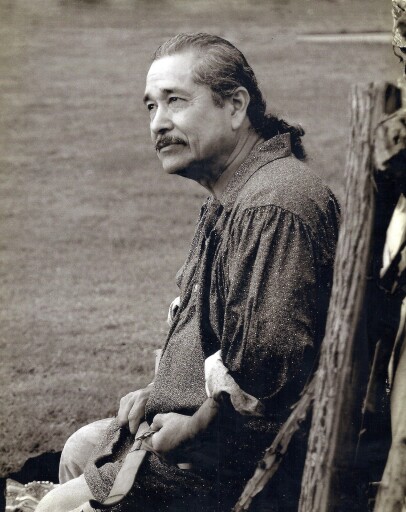

1942
Michael
2014
Michael Barnitz Berryhill
December 14, 1942 — July 17, 2014
Funeral services for Mike Berryhill will be held at 1 p.m., Mon., July 21 at Integrity Funeral Service in Henryetta. Wake services will be held from 6-8 p.m., Sun., July 20 at Integrity Funeral Service also. He died at his home, located south of Okmulgee, on Thurs., July 17, 2014. Michael Barnitz Berryhill was born on Dec. 14, 1942 at W.W. Hastings Indian Hospital in Tahlequah, Okla. to Thomas Jefferson and Blanche Pakoska [Bland] Berryhill. Mike belonged to the Alligator Clan and Cussetah Tribal Town and was the son of the Wind Clan and Deep Fork Eufaula Tribal Town. He was enrolled as a full-blood member of the Muscogee (Creek) Nation. He was raised on the allotment of his grandmother, Annie Kanard Berryhill, in Wilson Community, Okmulgee County. It was there that he took solace in a close connection with the natural world where he grew up exploring the creeks and hunting. Mike was a member of Honey Creek Methodist Church; his formative years were spent attending Honey Creek and several other Methodist churches in the area. He attended Wilson School and graduated from high school at Haskell Institute. He enlisted in the U.S. Army where he was a trained medic of the 82nd Airborne Division. He married Jo Ann Skaggs in 1964; to this union two daughters were born. Mike married Julia Ann Selvidge of Dustin in 1976 in Okmulgee and remained married to her until his death. He worked as a machinist at Braden Carco Gearmatic Winch in Okmulgee and retired after 30 years of service. The most influential person in his life was his grandfather, Joseph Hill Berryhill. When Mike was a boy the elder Berryhill took him to the creek on the family home place. His grandfather climbed a tall bois d'arc tree and cut two straight limbs from which he crafted two small long bows -- one for Mike and one for his eldest brother. This gesture, along with the loving attention, kind patience, and tribal stories told to him by his grandfather had a lasting effect on Mike's values and the direction that he took nearly 40 years later. He was gravely concerned about the continuing loss of Mvskoke language, beliefs, and life ways. Having a military background, he was inclined toward an interest in the warrior societies and weaponry of the historic "Creek Confederacy". This became a passion that took him on a path to lead a revival for Mvskoke long bow culture. Mike spent the last 25 years spearheading efforts to revitalize Mvskoke long bow-making culture. After retiring from his trade he devoted the majority of his time to long bow work. Part of this effort included the reintroduction of ways related to cutting, gathering, and preparing natural resources for bow materials. He actively exercised his right, as a Muscogee tribal citizen, to cut bois d'arc, hard woods, and gather other natural resources on tribal trust lands. Mike did not view this opportunity as an entitlement, but as a privilege. In 2004 he formed Cvkotakse Seccvlke (Mvskoke Bow Shooters Society) from a core group of his bow-making students. Many of the people that are drawn to the society's regular cornstalk shoots are not bow makers, but this is what Mike wanted to make allowance for -- a venue for increasing the domains of bow culture through reintroducing social activity that was accessible to anyone that wanted to shoot. He was instrumental in advocating for Muscogee (Creek) Nation legislation that designates the west grounds of the tribal capitol for cultural use. In 2007 Mike was named as a "traditional expert" in the Muscogee (Creek) Nation tribal statute that created a committee that was charged with developing a master plan for a tribal museum. In 2009 he was bestowed the honor of "Living Legend" for his efforts to revitalize tribal long bow culture under the administration of former Muscogee (Creek) Nation Principal Chief A.D. Ellis. Mike's superior artisanship as a bowyer drew the attention of newspaper and magazine journalists who wrote stories about his work. He is also the subject of a feature-length documentary entitled Cvkotakse Hayv 'bow maker' that was produced with the assistance of Judge Patrick Moore -- Mike's good friend and one of the biggest supporters of his long bow revitalization efforts. He was skilled at making river cane arrows and numerous other items associated with historic Mvskoke and primitive Mississippian era material culture. Mike was one of the few American Indian people in Oklahoma that possessed the skills to process brain-tanned deer hides. He was very knowledgeable about tribal oral history as well as the historic Mvskoke period. He was an avid reader of classic texts in southeastern tribal history and anthropology. As a Christian, he fed his spirit through intense study of scripture and he also enjoyed reading Christian literature. Mike was also a past member of the Mvskoke Nation Honor Guard. He is preceded in death by: his parents; his aunt, Pauline Paskoska [Bland] Billy; two brothers, Thomas Paul Berryhill and Perry Lee Berryhill; and stepson, Dewayne Bean. Mike is survived by: his wife, Julia, of the home; daughter and son-in-law, Dr. Elise and Thomas Taylor of Broken Arrow; daughter, Stephanie Berryhill of Henryetta; sister and brother-in-law, Rita and Barton Williams of Wilson Community; brother and sister-in-law, Elliott and Renee Berryhill of Colorado Springs, Colo.; stepsons, Dewight Bean of Glenpool and Deon Bean of Tulsa; and grandchildren, Eco Barnett and Emily Fixico of Henryetta and Thomas and Joseph Taylor of Broken Arrow; and numerous nieces and nephews. Pallbearers are Mark Berryhill, Michael "Little Mike" Berryhill, Shawn Williams, Aaron Berryhill, and Eco Barnett. Honorary pallbearers are Barton Williams, Lonnie Hamilton, Lt. Col. Mike Farrell, Judge Patrick Moore, Thomas Taylor, and members of Cvkotakse Seccvlke. Mike will be laid to rest in the Berryhill-Kanard Family Cemetery located on the land where his relationship with the natural world first began.
To order memorial trees or send flowers to the family in memory of Michael Barnitz Berryhill, please visit our flower store.



